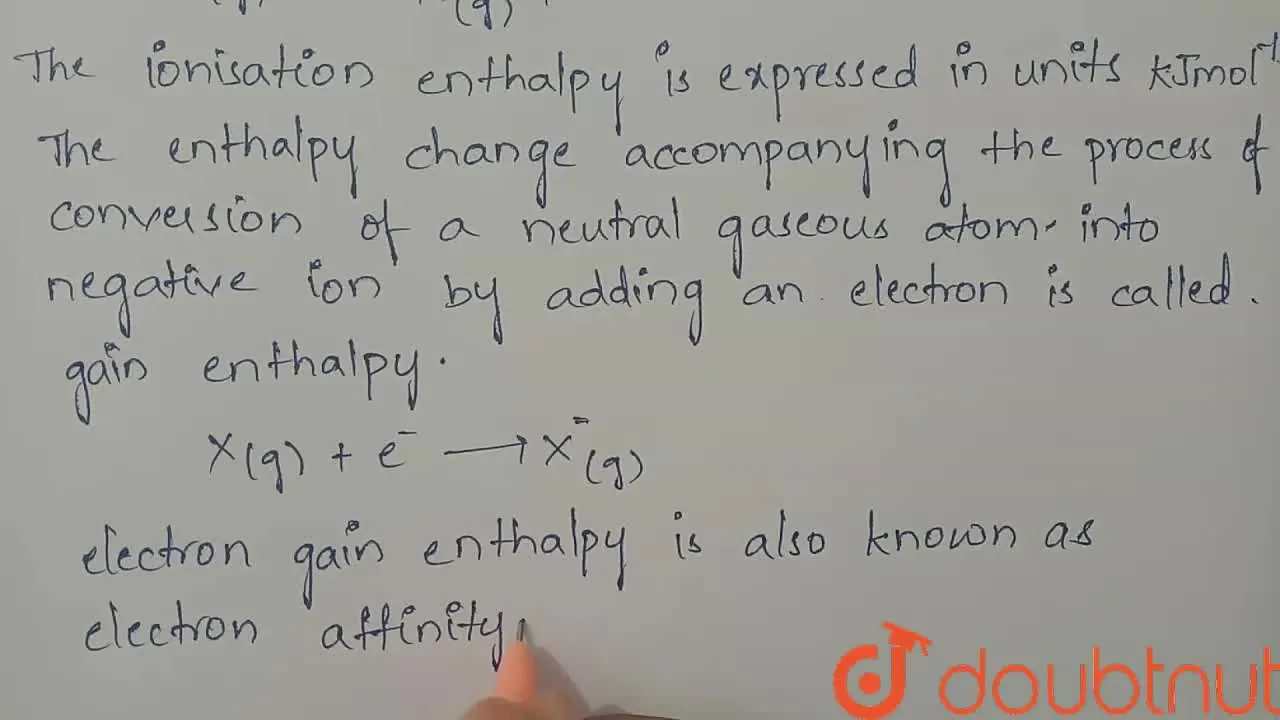Define ionisation enthalpy and electron affinity.Solution in Telugu
lonisation Enthalpy : The enthalpy change observed by the removal of an electron from the neutral isolated gaseous atom is called ionisation enthalpy.
Electron affinity: The enthalpy evolved by the addition of electron to neutral gaseous atom is called electron affinity.
Observe the following spontaneous reactions
(1)
(2)
In reaction (1) in reaction (2)
The decrease in Enthalpy may be a condition but not a necessary and sufficient condition for spontaneity of reaction.
lonization Energy and Electron Affinity : lonization energy and electron affinity are defined at absolute zero. At any other temperature, heat capacities for the reactants and the products have to be taken into account. Enthalpies of reactions for
(for ionization)
(for electron gain) at temperature, T is
The value of for each species in the above reaction is 5/2 R
So,
(for electron gain)
Therefore,
= (lonization enthalpy)
(ionization energy)+5/2 RT
=-A (electron affinity) =5//2 RT
Related Playlists
- BOOK - VIKRAM PUBLICATION ( ANDHRA PUBLICATION)CHAPTER - THERMODYNAMICSEXERCISE - Long Answer Questions4videos
THERMODYNAMICS
- BOOK - VIKRAM PUBLICATION ( ANDHRA PUBLICATION)CHAPTER - THERMODYNAMICSEXERCISE - Important Questions41videos
THERMODYNAMICS
- BOOK - VIKRAM PUBLICATION ( ANDHRA PUBLICATION)CHAPTER - THERMODYNAMICSEXERCISE - Very Short Answer Questions37videos
THERMODYNAMICS
- BOOK - VIKRAM PUBLICATION ( ANDHRA PUBLICATION)CHAPTER - THE S-BLOCK ELEMENTS EXERCISE - LONG ANSWER QUESTIONS12videos
THE S-BLOCK ELEMENTS
Similar Questions
State and explain the Hess's law of constant heat summation.
02:19View SolutionDefine a system. Give an example.
02:57View SolutionWhat is the information given by the terms thermodynamics?
01:59View SolutionJustify the inclusion of alkali metals in the same group of the periodic table with reference to the following.
(i) Electronic configuration.03:33View SolutionThe electron affinity of X is equal in magnitude with the ionisation potential of
05:19View Solutionआयनन एन्थैल्पी और इलेक्ट्रॉन बंधुता की व्याख्या करें।
01:43View SolutionIonisation energy and electron affinity of noble gases respectively are
02:23View SolutionWhat is the difference between ionisation potential and electron affinity?
02:28View SolutionDefine ionisation enthalpy and electron affinity.
03:09View SolutionElectron gain enthalpy values
48:15View SolutionDefine ionisation energy or Ionisation enthalpy .
01:37View SolutionIonisation energy of \(F^{-}\) is equal in magnitude with the electron affinity of "
01:37View SolutionDefine electron gain enthalpy or electron affinity. Give its unit.
01:37View SolutionEasy Trick For Electron Affinity | Electron Gain Enthalpy
05:43View SolutionIonisation energy of F− is equal in magnitude with the electron affinity of
01:31:04View SolutionIonisation energy of F− is equal in magnitude with the electron affinity of
45:23View Solution


